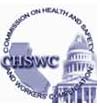Commission on Health and Safety and Workers' Compensation
Insurance Industry and Coverage
In 1993, workers' compensation reform legislation repealed California's 80-year-old minimum rate law and replaced it beginning in 1995 with an open-competition system of rate regulation in which insurers set their own rates based on "pure premium advisory rates" developed by the Workers' Compensation Insurance Rating Bureau (WCIRB). The Commission has examined issues involving the insurance market, security for payment of compensation benefits, and the requirement that all employers secure the payment of compensation benefits.
- COVID-19 in the California Workers’ Compensation System: A Study of COVID-19 Claims and Presumptions Under Senate Bill 1159, RAND, 2021.
- The Impact of Experience Rating on Small Employers: Would Lowering the Threshold for Experience Rating Improve Safety? RAND, 2012
- Working Safer or Just Working Longer? The Impact of an Aging Workforce on Occupational Injury and Illness Costs, February 2011
- Study of Benefit Notices and Recommendations, July 2010
- California’s Volatile Workers’ Compensation Insurance Market: Problems and Recommendations for Change, RAND, December 2009
- Report on Self Insurance Groups, December 2009
- Workers’ Compensation Medical Payment Accuracy Study, California Department of Insurance, June 2008

- CHSWC Background Paper on the Impact of Terrorism and California Workers’ Compensation, April 2006
- Issue paper on tax status of Self-Insured Groups (SIGs), April 2006
- United States Longshore and Harbor Workers' Compensation market in California, April 2005
- State of the Workers' Compensation insurance industry in California, April 2002
August 2022


